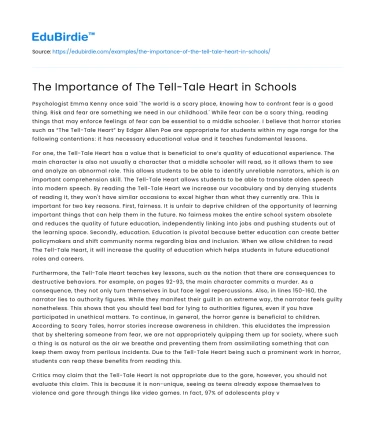Psychologist Emma Kenny once said 'The world is a scary place, knowing how to confront fear is a good thing. Risk and fear are something we need in our childhood.' While fear can be a scary thing, reading things that may enforce feelings of fear can be essential to a middle schooler. I believe that horror stories such as “The Tell-Tale Heart” by Edgar Allen Poe are appropriate for students within my age range for the following contentions: it has necessary educational value and it teaches fundamental lessons.
For one, the Tell-Tale Heart has a value that is beneficial to one’s quality of educational experience. The main character is also not usually a character that a middle schooler will read, so it allows them to see and analyze an abnormal role. This allows students to be able to identify unreliable narrators, which is an important comprehension skill. The Tell-Tale Heart allows students to be able to translate olden speech into modern speech. By reading the Tell-Tale Heart we increase our vocabulary and by denying students of reading it, they won't have similar occasions to excel higher than what they currently are. This is important for two key reasons. First, fairness. It is unfair to deprive children of the opportunity of learning important things that can help them in the future. No fairness makes the entire school system obsolete and reduces the quality of future education, independently linking into jobs and pushing students out of the learning space. Secondly, education. Education is pivotal because better education can create better policymakers and shift community norms regarding bias and inclusion. When we allow children to read The Tell-Tale Heart, it will increase the quality of education which helps students in future educational roles and careers.
Save your time!
We can take care of your essay
- Proper editing and formatting
- Free revision, title page, and bibliography
- Flexible prices and money-back guarantee
Furthermore, the Tell-Tale Heart teaches key lessons, such as the notion that there are consequences to destructive behaviors. For example, on pages 92-93, the main character commits a murder. As a consequence, they not only turn themselves in but face legal repercussions. Also, in lines 150-160, the narrator lies to authority figures. While they manifest their guilt in an extreme way, the narrator feels guilty nonetheless. This shows that you should feel bad for lying to authorities figures, even if you have participated in unethical matters. To continue, in general, the horror genre is beneficial to children. According to Scary Tales, horror stories increase awareness in children. This elucidates the impression that by sheltering someone from fear, we are not appropriately quipping them up for society, where such a thing is as natural as the air we breathe and preventing them from assimilating something that can keep them away from perilous incidents. Due to the Tell-Tale Heart being such a prominent work in horror, students can reap these benefits from reading this.
Critics may claim that the Tell-Tale Heart is not appropriate due to the gore, however, you should not evaluate this claim. This is because it is non-unique, seeing as teens already expose themselves to violence and gore through things like video games. In fact, 97% of adolescents play video games and 66% of adolescents play video games that may contain violence. It would be better to read stories like the Tell-Tale Heart because there are multiple underlying benefits to reading Poe’s story whereas video games have been proven to negatively affect the behavior of children. In addition to this, when you read a story, you have the option of visualizing what you are reading, while playing a video game forces you see the gore. Also, according to Flood ‘16, parents prefer their children to read horror stories. 73% of parents believe horror stories help kids decide what is good and bad, 53% believe they help children learn to cope with difficult situations, and 48% believe they help children conquer fear. If children are already introduced to what the other side is saying and parents’ majority of parents prefer when children read horror stories, their entire claim is false.
In summation, I believe the Tell-Tale Heart is pertinent for middle schoolers. This is because of my contentions that include educational value. The Tell-Tale Heart improves the quality of education, which is important on the premise of fairness and future education. Without those two impacts, students cannot learn skills that help them after middle school. My second contention was that the Tell-Tale Heart teaches key lessons that are necessary to function in society. For example, from the narrators actions we can learn that there are consequences to doing unethical things, such as lying, killing, and stalking. The Tell-Tale Heart can also show the significance of telling the truth, although the reason why may be extreme. Opponents of this may claim that the gore of the Tell-Tale Heart makes it inappropriate, however this is a non-unique issue that I have proven to be fallacious. For these reasons, I believe the Tell-Tale Heart is appropriate and necessary for students within my age range.






 Stuck on your essay?
Stuck on your essay?

